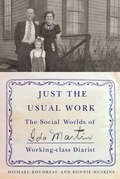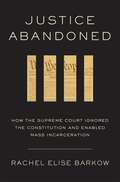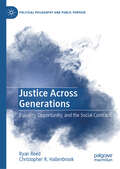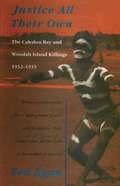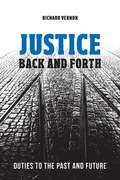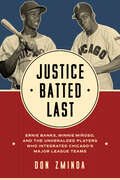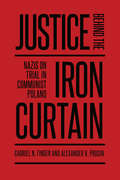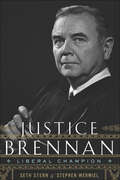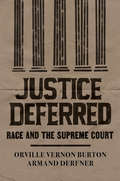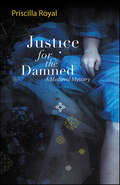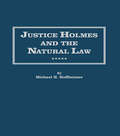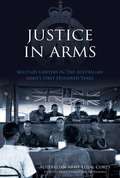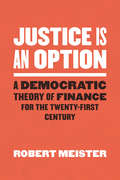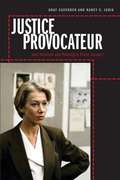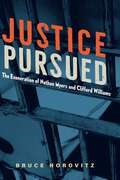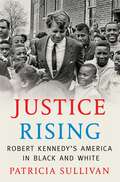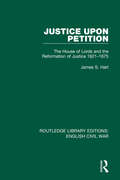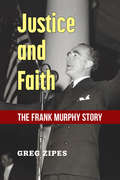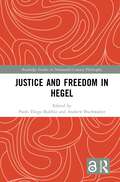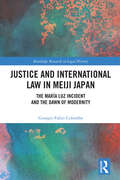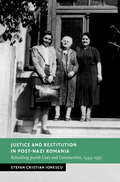- Table View
- List View
Just the Usual Work: The Social Worlds of Ida Martin, Working-Class Diarist
by Michael Boudreau Bonnie HuskinsBorn in 1907, Ida Martin spent most of her life in Saint John, New Brunswick. She married a longshoreman named Allan Robert Martin in 1932 and they had one daughter. In the years that followed, Ida had a busy and varied life, full of work, caring for her family, and living her faith. Through it all, Ida found time to keep a daily diary from 1945 to 1992.Bonnie Huskins is Ida Martin's granddaughter. In Just the Usual Work, she and Michael Boudreau draw on Ida's diaries, family memories, and the history of Atlantic Canada to shed light on the everyday life of a working-class housewife during a period of significant social and political change. They examine Ida's observations about the struggles of making ends meet on a longshoreman's salary, the labour confrontations at the Port of Saint John, the role of automobiles in the family economy, the importance of family, faith, and political engagement, and her experience of widowhood and growing old.Ida Martin's diaries were often read by members of her family to reconstruct and relive their shared histories. By sharing the pages of her diaries with a wider audience, Just the Usual Work keeps Ida's memory alive while continuing her abiding commitment to documenting the past and finding meaning in the rhythms of everyday life.
Justice
by Ralph ComptonHe was known as The Ranger. Arizona lawman Sam Burrack has seen his share of killers and the brutality they inflict upon the innocent. His relentless pursuit of the guilty has put things right time and again. In the town of Bannet, a gang of outlaws has avoided the law ... until now. Class Edding, son of a wealthy rancher, has led the cold-blooded Half Moon Gang on a spree of theft and murder that should have put him behind bars. But the corrupt local law sets the accused man free to wreak more havoc. Burrack refuses to give up, hunting down the gang members until only the leader remains. Even deadlier than the hunt, though, is the man hired by Class's father to find and kill Sam Burrack! With a price on his head, and powerful men protecting his prey, Burrack will need all of his skill and determination to see that even in a lawless world, justice will be done.
Justice Abandoned: How the Supreme Court Ignored the Constitution and Enabled Mass Incarceration
by Rachel Elise BarkowAn influential legal scholar argues that the Supreme Court played a pivotal role in the rise of mass incarceration in America.With less than 5 percent of the world’s population and almost a quarter of its prisoners, America indisputably has a mass incarceration problem. How did it happen? Tough-on-crime politics and a racially loaded drug war are obvious and important culprits, but another factor has received remarkably little attention: the Supreme Court. The Constitution contains numerous safeguards that check the state’s power to lock people away. Yet since the 1960s the Supreme Court has repeatedly disregarded these limits, bowing instead to unfounded claims that adherence to the Constitution is incompatible with public safety.In Justice Abandoned, Rachel Barkow highlights six Supreme Court decisions that paved the way for mass incarceration. These rulings have been crucial to the meteoric rise in pretrial detention and coercive plea bargaining. They have enabled disproportionate sentencing and overcrowded prison conditions. And they have sanctioned innumerable police stops and widespread racial discrimination. If the Court were committed to protecting constitutional rights and followed its standard methods of interpretation, none of these cases would have been decided as they were, and punishment in America would look very different than it does today.More than just an autopsy of the Supreme Court’s errors, Justice Abandoned offers a roadmap for change. Barkow shows that the originalist methodology adopted by the majority of the current Court demands overturning the unconstitutional policies underlying mass incarceration. If the justices genuinely believe in upholding the Constitution in all cases, then they have little choice but to reverse the wrongly decided precedents that have failed so many Americans.
Justice Across Generations: Equality, Opportunity, and the Social Contract (Political Philosophy and Public Purpose)
by Ryan Reed Christopher R. HallenbrookThis book presents a contractualist theory of intergenerational justice that avoids deficiencies in existing IGJ theories, e.g., the non-identity problem and the under-defining of "generations." The inability of social contract theory to provide a thorough accounting of justice between generations has been called an embarrassment and rightly so. That said, serious attempts have been made from a variety of contract perspectives to rectify the approach&’s shortcomings in the area of intergenerational justice. One of the most prominent contract theorists, John Rawls, attempted to address justice between generations in his theory via his just savings principle, but both versions of it were met with stinging criticism. As the climate crisis, among other challenges, presses the issue of justice for future generations, the authors believe that intergenerational justice is something that social contract theory should and can address. Specifically, they present a Rawlsian approach that begins with a clarified understanding of what is meant by &“generations,&” and proceeds from there to modify generational knowledge constraints in the original position. The authors then draw upon the concept of indirect reciprocity to round out an argument for a Rawlsian principle of justice between generations: intergenerational fair equality of opportunity. They then apply their intergenerational justice theory to five major public policy areas.
Justice All Their Own: The Caledon Bay and Woodah Island Killings, 1932–1933
by Ted EganAs punishment for murder, Aboriginal justice often calls for a ceremonial spear-thrust through the thigh. In Arnhem Land in the Northern Territory of Australia, the ceremony is called Makarrta. The white justice system demands imprisonment for life. Which justice should prevail? What is fair? Which is right? Ted Egan, well-known bushman, folklorist and media personality, is uniquely place to write this book. His close association with Aboriginal people enabled him to interview participants in the events—he 'sat down' in the country where the incidents took place. The product of forty years' research, this account of the killings, the protests and the subsequent trials in Darwin in 1934 presents a thorough analysis of the motives and behaviour of the various participants. It shows the disturbing and distressing consequences of the imposition of the British system of justice on people accustomed to their own predictable, consistent legal system, which itself is the product of a complex culture developed over thousands of years.
Justice At Risk: War Crimes Trials In Croatia, Bosnia And Herzegovina, And Serbia And Montenegro
by Human Rights WatchThe armed conflicts in the former Yugoslavia during the 1990s were characterized by widespread violations of human rights and humanitarian law. The International Criminal Tribunal for the former Yugoslavia (ICTY) will have adjudicated only a relatively small number of cases involving the most serious crimes by the time it ceases operating. All other war crimes cases -whether initiated domestically or referred back from the ICTY-will have to be tried by national courts in the states of the former Yugoslavia. Human Rights Watch has carried out extensive monitoring of domestic war crimes trials in the states of the former Yugoslavia. The monitoring indicates that, as a rule, the ordinary national courts of Bosnia and Herzegovina (particularly in Republika Srpska, one of the two "entities" in Bosnia and Herzegovina), Croatia, and Serbia and Montenegro are not currently equipped to hear war crimes cases-which are often politically and emotionally charged, as well as legally complex-in a fair manner. Key obstacles include: bias on the part of judges and prosecutors, poor case preparation by prosecutors, inadequate cooperation from the police in the conduct of investigations, poor cooperation between the states on judicial matters, and ineffective witness protection mechanisms.
Justice Back and Forth: Duties to the Past and Future
by Richard VernonIdeas of justice have traditionally focused on what individuals owe to one another and have drawn our attention to what is considered fair - what one of us owes to another is justly matched by what the other owes to them. However, what does justice require us to do for past and future generations?In Justice Back and Forth, award-winning author Richard Vernon explores the possibility of justice in cases where time makes reciprocity impossible. This "temporal justice" is examined in ten controversial cases including the duty to return historical artifacts, the ethics and politics of parenting, the punishment of historical offences, the right to procreate, and the imposition of constitutions on future citizens. By deftly weaving together discussions on historical redress and justice for future generations, Vernon reveals that these two opposing topics can in fact be used to illuminate each other. In doing so, he concludes that reciprocity can be adapted to serve intergenerational cases.
Justice Batted Last: Ernie Banks, Minnie Miñoso, and the Unheralded Players Who Integrated Chicago's Major League Teams
by Don ZmindaOn May 1, 1951, Orestes “Minnie” Miñoso took the field for the Chicago White Sox and broke the color line for Chicago major league baseball. Ernie Banks integrated the Chicago Cubs two years later. The future Hall of Famers began their Chicago baseball careers against the backdrop of a 1951 race riot in suburban Cicero, where a white mob abetted by local police attacked a building that had rented to Black tenants. Don Zminda’s account looks at these interconnected events alongside the little-known chronicle of Chicago’s slow track to integrating major league baseball. By the early 1950s, the Cubs and White Sox organizations had become rich in Black and Afro-Latino stars and talented prospects. Unlike Miñoso and Banks, however, most of these minor leaguers never advanced to the majors or, if they did, it was for little more than a cup of coffee. Zminda also profiles these players, from Charles Pope, the Cubs’ first Black signee, to larger-than-life fireballer Blood Burns. Essential and dramatic, Justice Batted Last uses the lives and careers of two Chicago legends to tell a story of integration on and off the diamond.
Justice Behind the Iron Curtain: Nazis on Trial in Communist Poland (German and European Studies)
by Alexander Prusin Gabriel FinderIn Justice Behind the Iron Curtain, Gabriel N. Finder and Alexander V. Prusin examine Poland’s role in prosecuting Nazi German criminals during the first decade and a half of the postwar era. Finder and Prusin contend that the Polish trials of Nazi war criminals were a pragmatic political response to postwar Polish society and Poles’ cravings for vengeance against German Nazis. Although characterized by numerous inconsistencies, Poland’s prosecutions of Nazis exhibited a fair degree of due process and resembled similar proceedings in Western democratic counties. The authors examine reactions to the trials among Poles and Jews. Although Polish-Jewish relations were uneasy in the wake of the extremely brutal German wartime occupation of Poland, postwar Polish prosecutions of German Nazis placed emphasis on the fate of Jews during the Holocaust. Justice Behind the Iron Curtain is the first work to approach communist Poland’s judicial postwar confrontation with the legacy of the Nazi occupation.
Justice Brennan: Liberal Champion
by Seth Stern Stephen WermielA sweeping insider look at the life of William Brennan, champion of free speech and widely considered the most influential Supreme Court justice of the twentieth centuryBefore his death, William Brennan granted Stephen Wermiel access to volumes of personal and court materials that are sealed to the public until 2017. These are what Jeffrey Toobin has called “a coveted set of documents” that includes Brennan’s case histories—in which he recorded strategies behind all the major battles of the past half century, including Roe v. Wade, affirmative action, the death penalty, obscenity law, and the constitutional right to privacy—as well as more personal documents that reveal some of Brennan's curious contradictions, like his refusal to hire female clerks even as he wrote groundbreaking women’s rights decisions; his complex stance as a justice and a Catholic; and details on Brennan’s unprecedented working relationship with Chief Justice Earl Warren. Wermiel distills decades of valuable information into a seamless, riveting portrait of the man behind the Court's most liberal era.
Justice Deferred: Race and the Supreme Court
by Orville Vernon Burton Armand DerfnerIn the first comprehensive accounting of the U.S. Supreme Court’s race-related jurisprudence, a distinguished historian and renowned civil rights lawyer scrutinize a legacy too often blighted by racial injustice. The Supreme Court is usually seen as protector of our liberties: it ended segregation, was a guarantor of fair trials, and safeguarded free speech and the vote. But this narrative derives mostly from a short period, from the 1930s to the early 1970s. Before then, the Court spent a century largely ignoring or suppressing basic rights, while the fifty years since 1970 have witnessed a mostly accelerating retreat from racial justice. From the Cherokee Trail of Tears to Brown v. Board of Education to the dismantling of the Voting Rights Act, historian Orville Vernon Burton and civil rights lawyer Armand Derfner shine a powerful light on the Court’s race record—a legacy at times uplifting, but more often distressing and sometimes disgraceful. For nearly a century, the Court ensured that the nineteenth-century Reconstruction amendments would not truly free and enfranchise African Americans. And the twenty-first century has seen a steady erosion of commitments to enforcing hard-won rights. Justice Deferred is the first book that comprehensively charts the Court’s race jurisprudence. Addressing nearly two hundred cases involving America’s racial minorities, the authors probe the parties involved, the justices’ reasoning, and the impact of individual rulings. We learn of heroes such as Thurgood Marshall; villains, including Roger Taney; and enigmas like Oliver Wendell Holmes and Hugo Black. Much of the fragility of civil rights in America is due to the Supreme Court, but as this sweeping history also reminds us, the justices still have the power to make good on the country’s promise of equal rights for all.
Justice For The Damned (Medieval Mysteries #4)
by Priscilla RoyalIt is May of 1272, and Prioress Eleanor of Tyndale, recovering from a near-fatal winter fever, journeys to Amesbury Priory to visit her aunt in time for the Feast of Saint Melor. Although Eleanor hopes to regain her strength in the midst of pleasant childhood memories, Death reveals a most troublesome fondness for her company. A ghost now haunts Amesbury. And when a man is decapitated near the river where the grim figure walks, Sister Beatrice, Eleanor's aunt and acting prioress of Amesbury, shows an uncharacteristic hesitancy about taking charge of any investigation. As others apparently fall victim to the vengeful ghost, Eleanor struggles to put a human face on the restless spirit, and Brother Thomas, pursuing a secret mission for the Church connected with the Priory's famous Psaltery, finds that his own demons have unexpectedly taken on a very human form....
Justice Holmes and the Natural Law: Studies in the Origins of Holmes Legal Philosophy (Distinguished Studies in American Legal and Constitutional History)
by Michael H. HoffheimerFirst Published in 1993. Routledge is an imprint of Taylor & Francis, an informa company.
Justice In Arms: Military Lawyers In The Australian Army's first Hundred Years
by Australian Army Legal CorpsJustice in Arms brings to life a fascinating and important element of Australia&’s legal history — the role of Army legal officers in Australia and in expeditionary operations from the Boer War until 2000. This is a comprehensive and absorbing history which describes the dynamic interaction of institutional and political imperatives and the personalities who managed this interaction over the decades. It is populated by colourful characters and legal luminaries and demonstrates that military justice is rightly concerned with discipline and cohesiveness. Reflecting broader societal norms, it is also concerned with the rule of law and respect for the rights, liberties and fair treatment of those who serve in the armed forces. Justice in Arms describes the extraordinary contribution of Army legal officers to both the profession of arms and the development of the law, charting the evolving personal and structural relationships between Army legal officers and command dictated by the changing legal needs of the Army and the broader Australian Defence Force. Today Army legal officers apply, adapt and shape the law to meet evolving needs in peacetime and during armed conflict and peace operations, ensuring the legitimacy of military action and the maintenance of domestic and international support for national objectives.
Justice Is an Option: A Democratic Theory of Finance for the Twenty-First Century (Chicago Studies in Practices of Meaning)
by Robert MeisterMore than ten years after the worst crisis since the Great Depression, the financial sector is thriving. But something is deeply wrong. Taxpayers bore the burden of bailing out “too big to fail” banks, but got nothing in return. Inequality has soared, and a populist backlash against elites has shaken the foundations of our political order. Meanwhile, financial capitalism seems more entrenched than ever. What is the left to do? Justice Is an Option uses those problems—and the framework of finance that created them—to reimagine historical justice. Robert Meister returns to the spirit of Marx to diagnose our current age of finance. Instead of closing our eyes to the political and economic realities of our era, we need to grapple with them head-on. Meister does just that, asking whether the very tools of finance that have created our vastly unequal world could instead be made to serve justice and equality. Meister here formulates nothing less than a democratic financial theory for the twenty-first century—one that is equally conversant in political philosophy, Marxism, and contemporary politics. Justice Is an Option is a radical, invigorating first page of a new—and sorely needed—leftist playbook.
Justice Is an Option: A Democratic Theory of Finance for the Twenty-First Century (Chicago Studies in Practices of Meaning)
by Robert MeisterMore than ten years after the worst crisis since the Great Depression, the financial sector is thriving. But something is deeply wrong. Taxpayers bore the burden of bailing out “too big to fail” banks, but got nothing in return. Inequality has soared, and a populist backlash against elites has shaken the foundations of our political order. Meanwhile, financial capitalism seems more entrenched than ever. What is the left to do? Justice Is an Option uses those problems—and the framework of finance that created them—to reimagine historical justice. Robert Meister returns to the spirit of Marx to diagnose our current age of finance. Instead of closing our eyes to the political and economic realities of our era, we need to grapple with them head-on. Meister does just that, asking whether the very tools of finance that have created our vastly unequal world could instead be made to serve justice and equality. Meister here formulates nothing less than a democratic financial theory for the twenty-first century—one that is equally conversant in political philosophy, Marxism, and contemporary politics. Justice Is an Option is a radical, invigorating first page of a new—and sorely needed—leftist playbook.
Justice Is an Option: A Democratic Theory of Finance for the Twenty-First Century (Chicago Studies in Practices of Meaning)
by Robert MeisterMore than ten years after the worst crisis since the Great Depression, the financial sector is thriving. But something is deeply wrong. Taxpayers bore the burden of bailing out “too big to fail” banks, but got nothing in return. Inequality has soared, and a populist backlash against elites has shaken the foundations of our political order. Meanwhile, financial capitalism seems more entrenched than ever. What is the left to do? Justice Is an Option uses those problems—and the framework of finance that created them—to reimagine historical justice. Robert Meister returns to the spirit of Marx to diagnose our current age of finance. Instead of closing our eyes to the political and economic realities of our era, we need to grapple with them head-on. Meister does just that, asking whether the very tools of finance that have created our vastly unequal world could instead be made to serve justice and equality. Meister here formulates nothing less than a democratic financial theory for the twenty-first century—one that is equally conversant in political philosophy, Marxism, and contemporary politics. Justice Is an Option is a radical, invigorating first page of a new—and sorely needed—leftist playbook.
Justice Provocateur: Jane Tennison and Policing in Prime Suspect
by Gray Cavender Nancy C. JurikJustice Provocateur focuses on Prime Suspect, a popular British television film series starring Oscar and Emmy award-winning actress Helen Mirren as fictional London policewoman Jane Tennison. Gray Cavender and Nancy C. Jurik examine the media constructions of justice, gender, and police work in the show, exploring its progressive treatment of contemporary social problems in which women are central protagonists. They argue that the show acts as a vehicle for progressive moral fiction--fiction that gives voice to victim experiences, locates those experiences within a larger social context, transcends traditional legal definitions of justice for victims, and offers insights into ways that individuals might challenge oppressive social and organizational arrangements. Although Prime Suspect is often seen as a uniquely progressive, feminist-inspired example within the typically more conservative, male-dominated crime genre, Cavender and Jurik also address the complexity of the films' gender politics. Consistent with some significant criticisms of the films, they identify key moments in the series when Tennison's character appears to move from a successful woman who has it all to a post-feminist stereotype of a lonely, aging career woman with no strong family or friendship ties. Shrewdly interpreting the show as an illustration of the tensions and contradictions of women's experiences and their various relations to power, Justice Provocateur provides a framework for interrogating the meanings and implications of justice, gender, and social transformation both on and off the screen.
Justice Pursued: The Exoneration of Nathan Myers and Clifford Williams
by Bruce HorovitzAn in-depth look at the reversal of a wrongful conviction in a noteworthy example of the justice system seeking to correct mistakes of the past In 2019, Nathan Myers and Clifford Williams were released after almost 43 years in prison when murder charges against them were dismissed in the first exoneration brought about through a Conviction Integrity Review unit in Florida. Justice Pursued is the story of this wrongful conviction and its landmark reversal, which made headlines as it was initiated by the same state office that sought the death penalty for both men in 1976.Journalist Bruce Horovitz describes in detail the events of the murder of Jeanette Williams and the one-sided trial, conviction, and life sentencing of Nathan Myers and Clifford Williams, drawing on first-person interviews as well as case documents, newspaper clippings, and other media coverage. Horovitz tells how the two men maintained their innocence for years and petitioned the state to reconsider the case. He highlights the creation of Florida’s first Conviction Integrity Review unit, which reinvestigated the evidence and helped overturn the original verdict. He also looks at the issue of compensating exonerees like Myers and Williams for time imprisoned for crimes they did not commit.Incorporating the perspectives of those involved in the initial case and its reexamination four decades later, this tragic story is also one of hope, perseverance, and vindication. Justice Pursued brings awareness to systemic failures in the criminal justice system, the toll these mistakes exact on victims, and the necessity of prosecutorial review in addressing the growing crisis of wrongful convictions in the United States.
Justice Rising: Robert Kennedy's America in Black and White
by Patricia SullivanA leading civil rights historian places Robert Kennedy for the first time at the center of the movement for racial justice of the 1960s—and shows how many of today’s issues can be traced back to that pivotal time. Bobby Kennedy was an unlikely civil rights hero. A Cold Warrior who once worked for Joe McCarthy, he grew up in a sheltered world where segregation was the norm. But when he became attorney general in 1961, he plunged headfirst into the politics of race. In this landmark reconsideration of his life and legacy, Patricia Sullivan reveals how he grasped the moment to emerge as a transformational leader at a tumultuous time. Drawing on government files, personal papers, and oral interviews with many of those who worked with him, Justice Rising shows how RFK used all the tools at his disposal to confront violent resistance to desegregation across the South. He pioneered the use of federal powers to challenge voting rights violations, intervened personally to desegregate schools, and championed criminal justice reform. The Justice Department under Kennedy became an incubator of change, where policy was imagined, tested, and put to work on the volatile frontier of race, crime, and the law. When violent racial uprisings broke out in northern cities and many called for more aggressive law enforcement, Kennedy pushed to address their root causes: entrenched poverty, decaying housing, substandard schools, predatory policing, and a near total absence of employment opportunities. As a presidential candidate before his tragic assassination in 1968 he sought to bridge the nation’s racial divisions. Deeply researched and compellingly written, Justice Rising offers a groundbreaking reconsideration of Robert Kennedy’s role in the culminating years of the civil rights movement and sheds new light on the battles that remain.
Justice Upon Petition: The House of Lords and the Reformation of Justice 1621-1675
by James S. HartOriginally published in 1991, this book traces the evolution of the House of Lords as a court for private litigation during the critically important years from 1621 to 1675. It offers new insights into contemporary politics, government and religion, adding an important dimension to our understanding of the House of Lords. This book is primary reading for advanced undergraduates and postgraduate students on courses on early Stuart England, the Civil War and Restoration history.
Justice and Faith: The Frank Murphy Story
by Greg ZipesFrank Murphy was a Michigan man unafraid to speak truth to power. Born in 1890, he grew up in a small town on the shores of Lake Huron and rose to become Mayor of Detroit, Governor of Michigan, and finally a U.S. Supreme Court Justice. One of the most important politicians in Michigan’s history, Murphy was known for his passionate defense of the common man, earning him the pun “tempering justice with Murphy.” Murphy is best remembered for his immense legal contributions supporting individual liberty and fighting discrimination, particularly discrimination against the most vulnerable. Despite being a loyal ally of Franklin Delano Roosevelt, when FDR ordered the removal of Japanese Americans during World War II, Supreme Court Justice Murphy condemned the policy as “racist” in a scathing dissent to the Korematsu v. United States decision—the first use of the word in a Supreme Court opinion. Every American, whether arriving by first class or in chains in the galley of a slave ship, fell under Murphy’s definition of those entitled to the full benefits of the American dream. Justice and Faith explores Murphy’s life and times by incorporating troves of archive materials not available to previous biographers, including local newspaper records from across the country. Frank Murphy is proof that even in dark times, the United States has extraordinary resilience and an ability to produce leaders of morality and courage.
Justice and Freedom in Hegel (Routledge Studies in Nineteenth-Century Philosophy)
by Andrew Buchwalter Paolo Diego BubbioThis volume explores the relationship between justice and freedom in Hegel’s practical philosophy, with a particular focus on the pivotal concept of reciprocal recognition. The contributors analyze the intersubjective relations between individuals and institutions through the lens of Hegel and demonstrate how his account of justice and freedom can be applied to address pressing issues in political philosophy.Despite extensive scrutiny of the concept of justice by political philosophers, Hegel’s unique account has been notably overlooked. What sets Hegel apart is his emphasis on the inseparable link between justice and freedom. Freedom is inextricably tied to an account of just social relations and institutions, while justice itself is intertwined with a robust endorsement of freedom. The chapters comprising this volume examine three crucial dimensions of Hegel’s framework for freedom and justice. First, the contributors address how Hegel’s distinctive integration of freedom and justice sheds new light on the nature of his practical philosophy. Second, they relate Hegel’s theory to other prominent accounts of justice, including Rawlsian forms of Kantian constructivism, Habermas’ neo‑Kantian discourse theory, republican views, neo‑Aristotelian accounts, and critical theory approaches. Finally, the contributors apply Hegel’s reconstructed theory of justice to ongoing debates encompassing criminal justice, distributive justice, global justice, environmental justice, and issues related to racial and gender justice, as well as populism.Justice and Freedom in Hegel will appeal to scholars and advanced students engaged in research on Hegel’s practical philosophy, 19th‑century philosophy, and political philosophy.
Justice and International Law in Meiji Japan: The María Luz Incident and the Dawn of Modernity (Routledge Research in Legal History)
by Giorgio Fabio ColomboThis book carries out a comprehensive analysis of the María Luz incident, a truly significant episode in Japanese and world history, from a legal perspective. In July 1872, the María Luz, a barque flying the Peruvian flag, carried Chinese indentured servants from Macau to Peru. After the ship stopped for repairs in Kanagawa Bay, a number of legal issues arose that were destined to change the perception and use of the law in Japan forever. The case had a tremendous impact on the collective imagination, both Japanese and international: it is one of the first occurrences in which an Asian country decided to resist the pressure of a Western nation, and responded using the most refined tools of domestic and international law. Moreover, the final outcome of the case (arbitration in front of the Czar of Russia) marks the debut of Japan on the stage of international arbitration. While historians have written widely on the subject, the legal importance of this event has been relatively neglected. This book uses the case to explore the technical legal issues Japan was facing in its transition from pre-modernity to modernity. These include unequal treaties, extraterritoriality clauses, the need to establish an updated judicial system, and a delicate balance between asserting sovereignty and resorting to diplomacy in solving disputes involving foreigners. Based on original documents, this book is an invaluable resource for researchers and academics in the fields of legal history, dispute resolution, international law, Japanese history and Asian studies.
Justice and Restitution in Post-Nazi Romania: Rebuilding Jewish Lives and Communities, 1944–1950 (New Studies in European History)
by Stefan Cristian IonescuOn 23rd August 1944, following the collapse of the pro-Nazi dictatorship of Ion Antonescu, Romania changed sides and abandoned the Axis to join the Allies. Justice and Restitution in Post-Nazi Romania explores the hopes, struggles and disappointments of Jewish communities in Romania seeking to rebuild their lives after the Holocaust. Focusing on the efforts of survivors to recuperate rights and property, Stefan Cristian Ionescu demonstrates how the early transitional government enabled short term restitution. However, from 1948, the consolidated communist regime implemented nationalizations which dispossessed many citizens. Jewish communities were disproportionality affected, and real estate and many businesses were lost once again. Drawing on archival sources from government documentation to diaries and newspaper reports, this study explores both the early success and later reversal of restitution policies. In doing so, it sheds light on the postwar treatment of Romanian Jewish survivors, and the reasons so many survivors emigrated from Romania.
